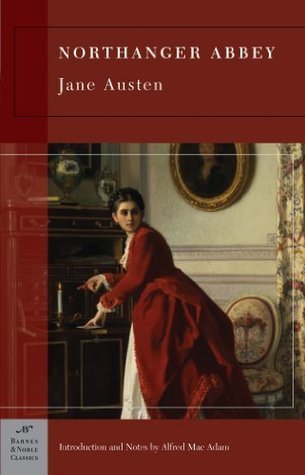Northanger Abbey by Jane Austen
Review of Northanger Abbey by Jane Austen
Northanger Abbey by Jane Austen (1817). Published by Barnes & Nobles Classics.
As I approach the end of my time in graduate school, and suddenly found myself with actual free time to go and read, I found myself staring at my stack of books more than usual. My book collection, which has been carefully curated throughout the years, has been a source of pride for me.
I spent so much time curating these books, but as some of the girls I work with say, buying books and actually reading them are two completely different hobbies. While I’ve read a good chunk of my books throughout the years, 40% of them I still have not had the chance to read.
That said,I made it my mission to start getting through these books. I was picking up some books I wanted to read the most and then made them into their own stack. And guess what? It worked.
Northanger Abbey was one of those books. I’d been meaning to read it for years, but suddenly I was ploughing through it and finished it in one afternoon.
Here’s my review!
Protagonist Catherine finds herself in her own Gothic novel situation, but with a twist.
There’s something important to note about Northanger Abbey: it’s very much a satire on the gothic novel, which were very much the rage when Jane Austen was living and working within that time. It was also published posthumously along with the novel Persuasion.
Our protagonist is 17, and her name is Catherine Morland. One of ten kids to a clergyman from the country, she finds herself reading many gothic novels and envisions the day where she, too, is a heroine. It seems just that is going to happen when their neighbors, the Allens, invite her on a trip to Bath.
There, Catherine meets Henry Tilney and dances with him. Catherine then makes more friends there, and even meets John, the friend of her older brother James. They continue talking, but John’s mother is not pleased that Catherine befriended the Tilneys, as they want her to marry John.
Turns out Catherine has no interest in him, and she continues to talk to both families anyways. Her brother James ends up getting engaged to the daughter, Isabella, instead, but Catherine’s father cannot procure the money immediately. Isabella begins chatting up Henry’s brother in the mean time.
The Tilneys then invite Catherine to their home: Northanger Abbey. She imagines the home to be a massive Gothic one, which Henry finds amusing, as it really isn’t. Catherine ventures through the home and finds out there are some abandoned rooms belonging to Mrs. Tilney, who died of illness.
Catherine suspects the patriarch imprisoned or murdered here because he doesn’t seem to greave her anymore. However, she finds nothing in the apartment, and Henry catches her in the act. He explains his father was indeed upset by his mother’s death, and Catherine thinks herself to be foolish and now in poor standing.
Back home, James breaks off the engagement with Isabella. She is engaged to Henry’s brother, and those in the home are skeptical of what’s actually happening. Isabella sends a letter, and everyone realizes that what James said wasn’t 100% true. The patriarch leaves the home, and Catherine thinks the house is in better spirits without him.
When he returns home, he is in a foul mood and sends her home. He demands she go by herself and without the proper tools, despite it being a massive trek back to her home. She goes home, but then Henry finds her one day randomly.
He explains his father believed that she was wealthy, and a proper match for Henry. When he realized she was not, he came back and decided to kick her out, and when Henry returned to the home, he forbid Henry from thinking about her.
Henry came to find her anyways, and says he wants to marry her. They go to her parents for approval, but they inform the couple they need Captain Tilney to approve, too. He eventually relents when Eleanor becomes engaged to a wealthy man, and that the Morlands aren’t completely poor.
Overall Thoughts
I found this to be quite an entertaining novel! Other writers from the same period as Austen I haven’t been able to get into as much in the past, but this was a pretty accessible novel to 1810s literature in my view.
That said, I don’t know if I would return to this book. I’m glad to have read it, but it would have to be several years before I could find myself wanting to reread it. I’d still keep my copy of the book because I can appreciate it quite a bit.
So go read this if you haven’t already! I think it’s a brilliant satire of the works that were popular during the period.
Follow me below on Instagram and Goodreads for more.


![Jeju-do (제주도) is one of those places that reminds you of how stunning the world is
[7.12.2024 부터 7.14.2024 까지]](https://images.squarespace-cdn.com/content/v1/5ea1f794501b7153b29e7cd7/1721033601522-554E76HR01JUHDWZBJ1I/image-asset.jpeg)









